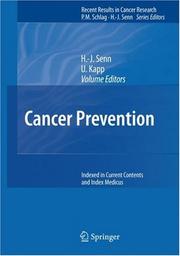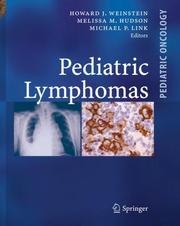| Listing 1 - 10 of 116 | << page >> |
Sort by
|

ISBN: 1280832568 9786610832569 1597451851 1588295117 Year: 2007 Publisher: Totowa, N.J. : [Oxford : Humana ; Blackwell, distributor],
Abstract | Keywords | Export | Availability | Bookmark
 Loading...
Loading...Choose an application
- Reference Manager
- EndNote
- RefWorks (Direct export to RefWorks)
This is truly an exciting time in the field of neuro-oncology, particularly in the area of hi- grade gliomas. The management of patients with high-grade gliomas has historically been one of the most challenging and disheartening fields in medicine, where failure is the rule and longevity is the exception. The jaded often state that despite purported advances in surgical and radiotherapeutic techniques and a myriad of clinical trials of medical therapies, the s- vival statistics for glioblastoma have not changed in the last three decades. The nihilism associated with these tumors is such that some practitioners still advise against treatment or even biopsy, recommending palliative care with the diagnosis based only on history and an MRI scan. If the current state-of-the-art in the diagnosis and management of high-grade gliomas was truly so bleak, there would be no reason to compile and publish a monograph on the subject. The fact is that we have recently entered an era where real progress is being made in our understanding and treatment of high-grade gliomas that is directly benefiting some patients. We are slowly but surely chipping away at this problem. One approach has exploited correlations between particular molecular markers and therapeutic response. The first such “breakthrough” in high-grade glioma was the observation that loss of chromosomes 1p and 19q uniformly predict chemosensitivity in anaplastic oligodendrogliomas (1).
Gliomas. --- Nervous system --- Tumors. --- Tumors

ISBN: 1280864346 9786610864348 3540376968 354037695X Year: 2007 Publisher: New York : Springer,
Abstract | Keywords | Export | Availability | Bookmark
 Loading...
Loading...Choose an application
- Reference Manager
- EndNote
- RefWorks (Direct export to RefWorks)
This volume contains the main proceedings of the fourth international conference on "Cancer Prevention 2006," which was held during February 16–18, 2006, in St. Gallen, Switzerland. Written by international experts in the field, the book comprises a comprehensive update on the most recent developments in the upsurging fields of molecular biology and cancer genetics and their interactions with clinical epidemiology and cancer prevention at various levels: genetic/biologic predisposition and definition of high-risk groups; preclinical models and tumor prevention; prospects of surrogate endpoints and biomarkers; progress in imaging and detection of neoplastic precursor lesions; problems with Cox-2 inhibitors in tumor chemoprevention; primary and secondary prevention of gynecological, breast, gastrointestinal and genitourinary cancers. In addition, the future prospects of cancer chemoprevention are discussed.
Cancer --- Oncology --- Prevention --- Tumors

ISBN: 1280832495 9786610832491 1597451657 1588296563 161737699X Year: 2007 Publisher: Totowa, NJ : Humana Press : Imprint: Humana,
Abstract | Keywords | Export | Availability | Bookmark
 Loading...
Loading...Choose an application
- Reference Manager
- EndNote
- RefWorks (Direct export to RefWorks)
Target discovery is a field that has existed for several years but is so vibrant today because of the recent progress in our understanding of the molecular mechanisms of many human diseases and the technical advances in target identification and validation. More sophisticated gene profiling technologies, such as DNA microarrays and serial analysis of gene expression, permit rapid identification of lead targets. Moreover, analysis of gene networks in living organisms allows the identification of target genes that operate in defined physiological pathways. With the sequencing of several genomes completed and the rapidly growing gene expression databases, there is now greater impetus than ever before for in silico discovery of therapeutic targets. Also, recent advances in genetic technologies have increased our ability to generate mouse models for human diseases. The implications of these genetically modified animals in drug development are several, including identification of new drug targets, predicting efficacy, and uncovering possible side effects. Together, these recent technical advances should allow researchers to make the most informed choice early and advance the chosen targets toward clinical studies. Regarding cancers, any difference between a cancer and a normal cell could potentially be exploited as a therapeutic target. The hope is that drugs targeting specific constituents or pathways in cancer cells will provide more effective therapy, either alone or in combination with other currently used anticancer drugs. In addition to drug targets, identifying new target antigens remains as much of a challenge as improving tumor vaccines already in the clinic.
Oncology . --- Oncology. --- Tumors

ISBN: 1280832614 9786610832613 1597452084 1588298906 1617378275 Year: 2007 Publisher: Totowa, NJ : Humana Press : Imprint: Humana,
Abstract | Keywords | Export | Availability | Bookmark
 Loading...
Loading...Choose an application
- Reference Manager
- EndNote
- RefWorks (Direct export to RefWorks)
Target Discovery and Validation Reviews and Protocols, Volumes 1 and 2 review the most progressive and current methods for drug target discovery and validation. These volumes explore how recent improvement in understanding the molecular mechanisms of human pathology is impacting drug target discovery in the laboratory and in real therapeutics, specifically for cancers and autoimmune disorders. Volume 1 focuses on novel and innovative techniques, and presents the most up-to-date protocols available for maximizing the likelihood of achieving target-selective inhibition in vivo while minimizing side effects. The profound impact of genomics, proteomics and bioinformatics on target discovery is explored, and specific attention is given to the role of transgenic and knockout animals in functional genomics and target validation. Cancer researchers will find tremendous value in the molecular classification of breast cancers and the review of protocols for tumor antigens and cancer vaccines. The methods and protocols collected here, all reviewed by leading scientists and clinicians, present the practical details necessary for translating the enormous discovery potential of the genome into real therapeutic products. Volume 2 collects all the practical details required for efficient translation of discovered targets into real pharmaceutical drugs. Specific targets in cancers and autoimmunity are described and the potential of using siRNAs, antisense oligonucleotides and RNA aptamers in patients is reviewed. This volume explores the tremendous impact of the application of genotyping and gene expression profiling on the future of healthcare, and presents cutting-edge protocols to aid in bringing agents against specific targets closer to application in the clinic. Collectively, these volumes provide a thorough review of the most cutting-edge methods available for each step in drug target identification, validation, and clinical application. For researchers, an understanding of available methods aids in the creation of innovative experiments in the laboratory, and the successful translation of target discovery to real therapeutics.
Oncology . --- Oncology. --- Tumors
Book
Year: 2007 Publisher: [Bethesda, Md.] : National Cancer Institute,
Abstract | Keywords | Export | Availability | Bookmark
 Loading...
Loading...Choose an application
- Reference Manager
- EndNote
- RefWorks (Direct export to RefWorks)
Book
ISBN: 051127128X 0511722079 Year: 2007 Publisher: Cambridge : Cambridge University Press,
Abstract | Keywords | Export | Availability | Bookmark
 Loading...
Loading...Choose an application
- Reference Manager
- EndNote
- RefWorks (Direct export to RefWorks)
Hemangiomas and superficial vascular malformations are disfiguring birthmarks that can occur over 65% of a child's body. This atlas will focus on the classification, multidisciplinary approach, recognition and identification, and treatment options for this class of pathology. Vascular malformations, composed of malformed vessels, never regress and sometimes expand rapidly. They occur in any body part including viscera. They cause cosmetic problems, functional disability and can be life threatening and require radiologic imaging and pathology to recognize and perform differential diagnosis on various vascular anomalies. In addition, new techniques, including molecular biology procedures, have evolved allowing less invasive and a more effective approach to diagnosis and treatment.
Blood-vessels --- Tumors --- Abnormalities
Periodical
ISSN: 20327072 Year: 2007 Publisher: [Mol, Belgium : Pharma Publishing & Media Europe]
Abstract | Keywords | Export | Availability | Bookmark
 Loading...
Loading...Choose an application
- Reference Manager
- EndNote
- RefWorks (Direct export to RefWorks)
Cancer --- Chemotherapy --- Cancers --- Carcinoma --- Malignancy (Cancer) --- Malignant tumors --- Tumors

ISBN: 128074555X 9786610745555 354068753X 3540203567 Year: 2007 Publisher: Berlin ; New York : Springer,
Abstract | Keywords | Export | Availability | Bookmark
 Loading...
Loading...Choose an application
- Reference Manager
- EndNote
- RefWorks (Direct export to RefWorks)
T is is the first edition of Pediatric Lymphomas. Treatment of both Hodgkin and non-Hodgkin lymphomas, editors have been colleagues for more than 25 years and lymphoproliferative disorders associated with - and have been involved in the design and coordination immunodeficiency. In addition, three chapters focus on of clinical trials and multimodality approaches for the pathology, molecular biology, and genetics of children with Hodgkin and non-Hodgkin lymphomas. Hodgkin and non-Hodgkin lymphoma including the Progress in elucidating the pathogenesis and in the di- rare cutaneous lymphomas. We hope that Pediatric agnosis and treatment of lymphomas in children has Lymphomas will be a useful resource for practitioners been one of the great success stories in pediatric oncology from the many different disciplines involved in the. Prior to 1970, fewer than 20% of children with comprehensive care of children with lymphomas. malignant lymphomas survived. Today, more than T e authors are all leading experts in the area of 90% of children diagnosed with Hodgkin lymphoma childhood lymphomas. We wish to thank them for all survive and more than 80% of children with non- of the time and effort that went into their contributions.- Hodgkin lymphoma are considered cured. If this first edition is helpful to our diverse re- improvement in survival has occurred as the result of ership, it is because of the authors.
Lymphomas in children. --- Tumors in children. --- Pediatric oncology --- Children --- Tumors in children --- Diseases

ISBN: 0781795958 9780781795951 Year: 2007 Publisher: Philadelphia Lippincott Williams & Wilkins
Abstract | Keywords | Export | Availability | Bookmark
 Loading...
Loading...Choose an application
- Reference Manager
- EndNote
- RefWorks (Direct export to RefWorks)
Cancer pain --- Cancer --- Cancers --- Carcinoma --- Malignancy (Cancer) --- Malignant tumors --- Tumors --- Treatment --- Complications&delete& --- Palliative treatment --- Complications

ISBN: 0521848512 9780521848510 9780511722073 Year: 2007 Publisher: Cambridge ; New York : Cambridge University Press,
Abstract | Keywords | Export | Availability | Bookmark
 Loading...
Loading...Choose an application
- Reference Manager
- EndNote
- RefWorks (Direct export to RefWorks)
Hemangiomas and superficial vascular malformations are disfiguring birthmarks that can occur over 65% of a child's body. This atlas will focus on the classification, multidisciplinary approach, recognition and identification and treatment options for this class of pathology. Vascular malformations, composed of malformed vessels, never regress and sometimes expand rapidly. They occur in any body part including viscera. They cause cosmetic problems, functional disability and can be life threatening and require radiologic imaging and pathology to recognize and perform differential diagnosis on various vascular anomalies. In addition, new techniques, including molecular biology procedures, have evolved allowing less invasive and a more effective approach to diagnosis and treatment.
Arteriovenous Malformations --- Blood-vessels --- Vascular Neoplasms --- Abnormalities --- Tumors
| Listing 1 - 10 of 116 | << page >> |
Sort by
|

 Search
Search Feedback
Feedback About UniCat
About UniCat  Help
Help News
News